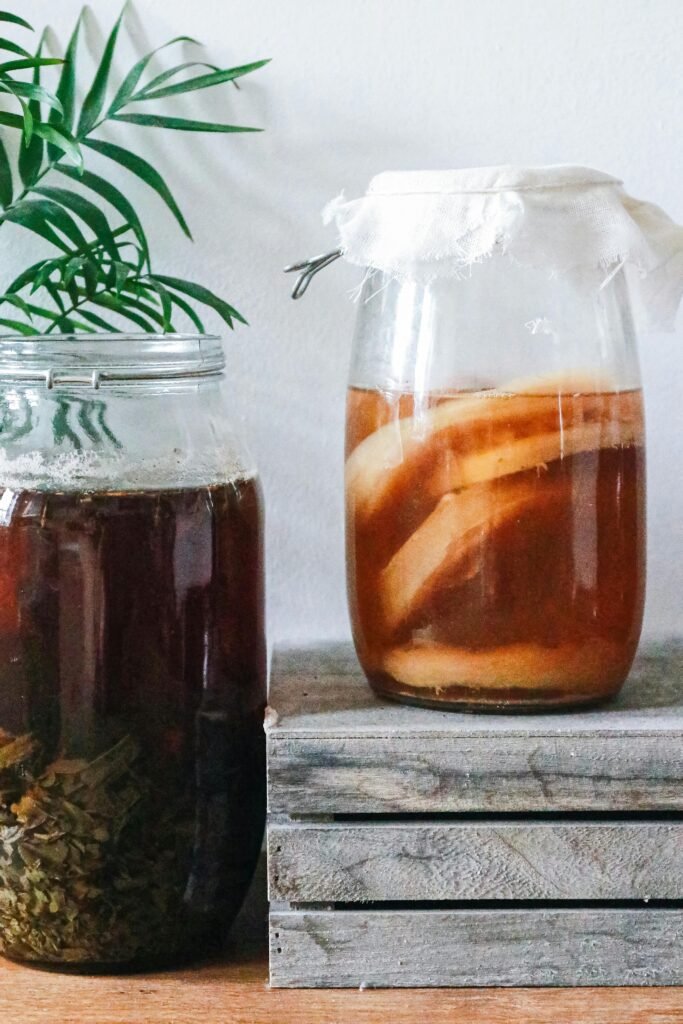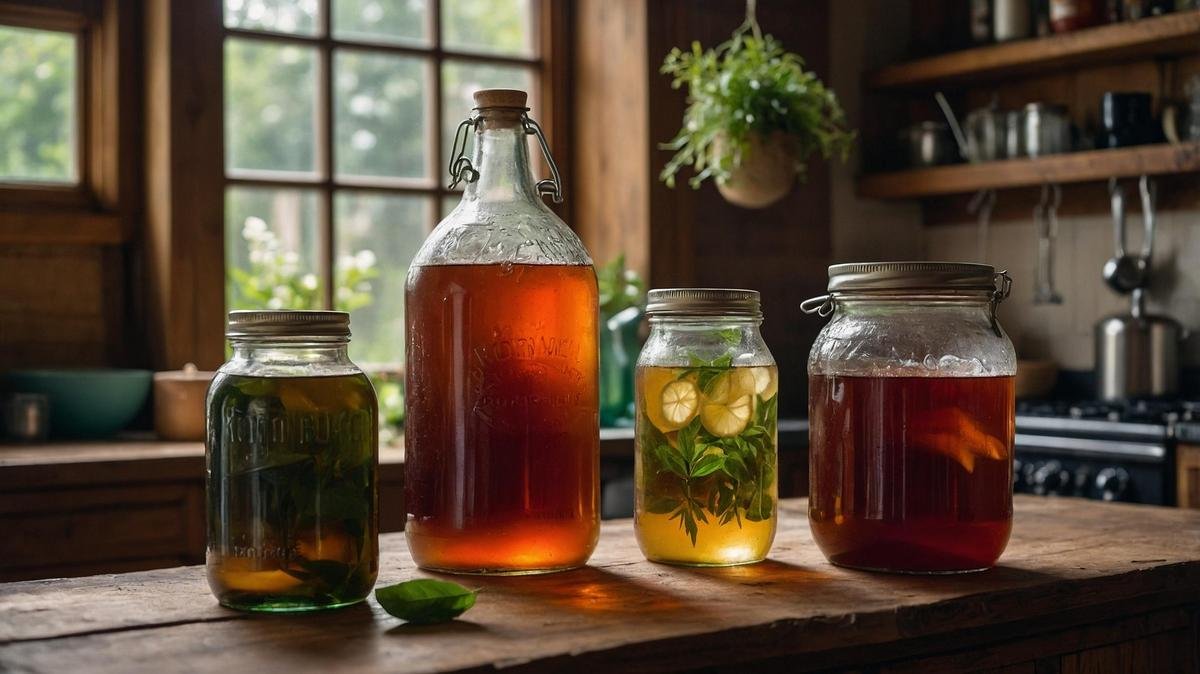TL;DR:
- Kombucha should be stored in the fridge to slow fermentation and maintain taste.
- Optimal storage temperature is 35°F to 45°F.
- Unopened store-bought kombucha can be safe at room temperature briefly, but refrigeration is recommended.
- Homemade kombucha should be kept chilled post-production.
- Always check for signs of spoilage (smell, taste, appearance) before drinking.
- Opened kombucha should be refrigerated and consumed within three hours of being out.
- Expired kombucha may smell off, taste sour, and appear cloudy with excessive bubbles.
- Brands like Health-Ade and Synergy recommend refrigeration to preserve quality and safety.
___________________________________________________________________________________
Does Kombucha Need to Be Refrigerated for Safe Storage?
Kombucha lovers often wonder, does this fizzy drink need refrigeration? The short answer is yes! But because not everyone agrees, we’ll explore the proper storage methods for kombucha, including health-ade varieties. Knowing how to store kombucha sets the course to our quest for ethically sourced products. Let’s go and break down the facts to help you make the right choices!
Does Kombucha Need to Be Refrigerated?
Kombucha should be stored in the fridge. Keeping it cold slows down the fermentation frenzy, so your drink stays tasty and fizzy. If kombucha warms up, it might go a bit wild, turning sour and losing that perfect pop.
While store-bought kombucha can handle a short room temperature stint -thanks to the added preservatives in the mix, it is still best to not let it sit too long so that the taste and quality stay top-notch. Unopened kombucha can be okay with room temp, but giving it a chill before you drink is the way to go. Drinking it warm might give it an unexpected punch.
Can Different Brands of Kombucha Have Different Refrigeration Requirements?

Do all kombucha brands need the same refrigeration treatment, or do they have their own chill rules? Let’s break it down:
- Kombucha brands aren’t all created equal when it comes to refrigeration. Brands with fewer preservatives, like Health-Ade, definitely need to stay cold. If it’s left to bask at room temperature, it can start to over-ferment.
- Synergy Kombucha is not for lounging around outside the fridge. It needs to stay chilled all the way, to preserve its flavor and safety. Ignoring the fridge rule with this one, could lead to potential Kombucha catastrophe.
The easiest way to know if your kombucha needs to be refrigerated is to check the label or the brand’s website. Look for phrases like “refrigerate after opening” It’s a little nudge from the makers to keep your brew at its best.
Next time you grab a kombucha, give it the cool treatment it deserves. It’s the best way to keep that fizzy fun fresh and fabulous!
What Are the Risks of Drinking Unrefrigerated Kombucha?
So, you’ve let your kombucha sit out a bit too long, huh? Here’s why that’s a catastrophe waiting to happen:
Kombucha is like a science experiment in a bottle. Leave it out of the fridge for days, and it might turn into a breeding ground for bacteria, which could potentially cause an upset tummy. Without the chilly confines of the fridge, kombucha can start to over-ferment and could make you sick. Drinking kombucha that’s had too much-unrefrigerated time might lead to stomach cramps, nausea, or worst, diarrhea . Not exactly the kind of adventure you’re looking for! It is best to only drink kombucha stored correctly- refrigerated!
How to Properly Store Kombucha After Opening?

When you open a bottle of kombucha, proper storage is key. This, you have to remember, opened kombucha needs to be refrigerated regardless of its brand. Leave it out of the fridge and it can turn into a failed science experiment! Best practices for storing kombucha? Seal that bottle tight after each pour to keep the air out. Avoid heat like the plague. Kombucha loves a cool, dark spot where it can chill. Heat messes with its texture and taste, so keep it cool and it’ll stay delicious.
How to Recognize Expired Kombucha and Its Effects?
So, your kombucha’s been hanging out in the fridge for a while, and you’re wondering if it’s still up for a sip? Here’s the lowdown on recognizing when your bubbly brew has outstayed its welcome:
- Sniff Test: If your kombucha suddenly smells like a science experiment gone wrong, it’s probably past its prime. Fresh kombucha should have a tangy, but pleasant aroma. If it smells off or like something’s gone amiss, it’s time to let it go.
- Taste Twist: A little tang is normal, but if it tastes like you’re sipping straight-up vinegar, that’s a sign it’s over-fermented. Trust your taste buds—if it’s more sour than a lemon, it’s best to pass.
- Bubble Trouble: Kombucha should have a lively fizz, but if it’s fizzing like an over-caffeinated soda, it might be over-the-hill. Too many bubbles can mean it’s had too much fun fermenting.
- Color Code: Fresh kombucha typically shines with a bright, clear appearance. If it’s looking cloudy or dull, it’s probably time to say goodbye. A color change can signal that it’s past its prime.
In a nutshell, if your kombucha’s smell, taste, or appearance seems a bit off, trust your instincts and toss it. Better safe and sour-free than sorry!
Conclusion
In summary, proper kombucha storage is important to enjoying its unique flavor and health benefits. Keeping it cold helps to raise its shelf life and maintain safety. Different brands might have special requirements, best to always check labels! Ignoring these guidelines can lead to unpleasant changes in taste and potential health risks. Ethical consumerism extends to choosing brands that prioritize transparency and product integrity. By supporting companies that follow these principles, you uphold traditional values while making informed choices. Stand firm in supporting brands that respect your standards and keep your kombucha experience enjoyable and safe.
Frequently Asked Questions
- What temperature ranges are optimal for kombucha storage?
Kombucha should stay in a cool spot, ideally between 35°F and 45°F. Keeping it in the fridge is best. It slows down the fermentation, helping it last longer. - How does the fermentation process impact the need for refrigeration?
Kombucha ferments at room temp. This process makes it fizzy. But too much fermentation changes its taste. It may become too sour over time. Refrigeration helps control this and slows the process. - Are there specific factors to consider for homemade versus store-bought kombucha?
Homemade kombucha often needs to be kept chilled after making. Store-bought kombucha usually stays safe without cold for a short time. But once you open it, it goes bad faster. - How do storage conditions affect the flavor and quality of kombucha?
Kombucha stored in the fridge tastes better. Warm temps can ruin its flavor. If you leave it out too long, it can go flat and sour. Always aim to store it properly for the best taste and quality.


